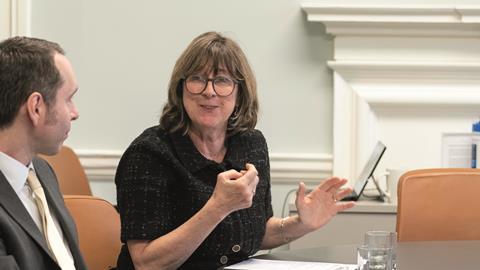How should firms manage risk, compliance and client care in the context of rising demands relating to due diligence? Eduardo Reyes reports from the latest Gazette roundtable discussion.
At the table
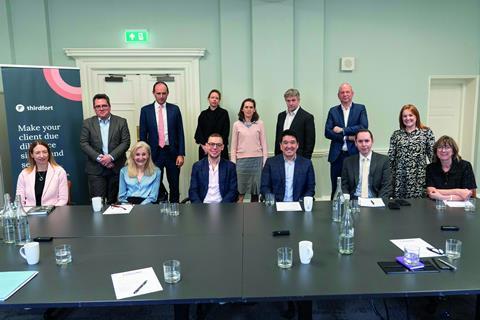
Back row (l-r) Eduardo Reyes Law Society Gazette; Rob Dalling Jenner & Block; Anna Bradshaw Peters & Peters; Victoria Hodges Teacher Stern; John Binns BCL Solicitors; Iain Wilson Brett Wilson; Harriet Holmes Thirdfort;
Seated, front row (l-r) Colette Best Kingsley Napley; Sheona Wood DWF; Olly Thornton-Berry Thirdfort; Andrew Cheung Pinsent Masons Vario; Jonathan Sewell Payne Hicks Beach; Sue Mawdsley Keystone Law
‘The compliance function is broad, onerous and getting increasingly burdensome,’ Payne Hicks Beach partner Jonathan Sewell reflects at the start of this Gazette roundtable discussion. Compounding this challenge, he notes, is the legal sector’s ‘inclination’ to think that ‘compliance matters can be outsourced to the compliance team – and perhaps specifically the COLP [compliance officer for legal practice]’. In reality, he points out: ‘We all know that isn’t the case and that everybody in a law firm, lawyer or not, has responsibility for compliance with the SRA’s framework and obligations.’
Keystone Law’s Sue Mawdsley has seen the growing dangers of risk and the burden of compliance first-hand. She co-founded the law firm Legal Risk 21 years ago, specialising in regulatory advice to other law firms. ‘Currently, the feeling is that the AML side of things is just incredibly challenging,’ she says. On money laundering developments firms must keep up with, she notes, it is a case of ‘blink and you’ll miss it’.
'We’ve had new regulations hit us basically every 18 months'
Colette Best, Kingsley Napley
Many of those present combine roles such as money laundering reporting officer (MLRO) or COLP with fee-earning work. Teacher Stern partner Victoria Hodges is both a residential property solicitor and her firm’s deputy MLRO. The firm’s organisation of risk and compliance functions reflects their growing significance, expanding from one partner to her addition as deputy. Now, she relates: ‘We’ve got two full-time analysts as well who purely deal with AML matters. And during that period the headcount of the firm has remained relatively static.’
Kingsley Napley’s Colette Best, who was formerly the Solicitors Regulation Authority’s first director of anti-money laundering, identifies 2007 to 2017 as ‘a kind of golden age of static regulation compared to since’. From 2017, she notes: ‘We’ve had new regulations hit us basically every 18 months.’
‘When I got into this area, it was very AML-focused,’ Best says. Now, though, ‘it is snowballing to take into account wider responsibilities… sanctions off the back of the Russia/Ukraine [conflict] was a massive shift for everyone in practice’.
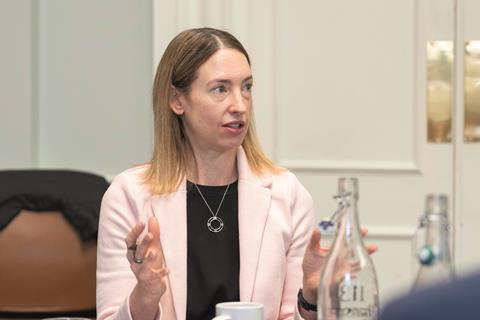
The week before the roundtable meets, Best notes, the Legal Services Board published a consultation on its guidance relating to a new regulatory objective on the Economic Crime Act. Keeping compliance functions ‘tooled up’ is a challenge, she says.
Andrew Cheung, global general counsel at Pinsent Masons and Pinsent Masons Vario, notes that his firm’s compliance function is now 92-strong across offices in seven countries. He focuses on the issue of ‘accountability’ within firms.
‘[Accountability] is critical to a good compliance culture,’ Cheung says. ‘But it’s really hard to make people accountable when there’s such a large body of regulation which is changing so rapidly. They have to be armed with knowledge in order to be made accountable. And then the partnership structure doesn’t lend itself very well to day-to-day accountability, because there’s a lot of independence that a partner has to manage their practice and do it in a way that they like.’
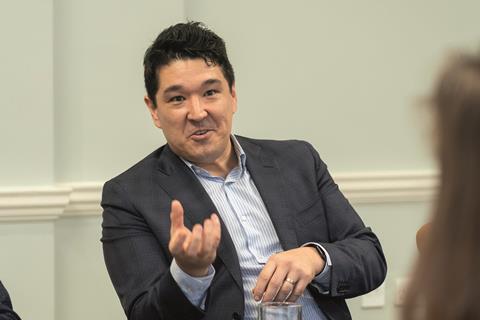
Accountability is most challenging, he relates, around issues of non-regulatory ‘reputational harm. That’s where I feel the function is evolving the most at the moment. And it’s becoming something very different to what it was maybe 10 years ago’, he says.
Most resources, Cheung notes, are devoted to the ‘intake’ element of the process. ‘It makes onboarding and AML… a process. And it’s a process that people do near enough 4,000 times a year. When you do something 4,000 times a year, you stop seeing it in quite the same way,’ he reflects. ‘It becomes commoditised... It’s something you do in order to get a file open, in order to do work as opposed to a critical safety check that’s going to help keep you out of prison and the firm not fined.’
As a result, Cheung says, a firm needs ways to ‘keep that message around it fresh... it’s a real challenge’.
'Think of the culture of a law firm, where everyone from the partners down know that they have to have an ethical compass, they have to be alert to risk'
Sheona Wood, DWF
Although owned by Pinsent Masons, Vario has a ‘new law’ consultant business model. Are the challenges different? ‘It’s much more agile and it doesn’t fit comfortably in a traditional law firm model,’ Cheung says. He likens it to the thinking that any firm has to put into ‘outcomes-focused’ regulation.
‘You’re trying to find a flexible way to achieve the spirit of certain things,’ he says. As the model has lawyers working in-house with clients, there are additional challenges with regard to establishing the requirements of Vario lawyers working in markets with non-law sector regulators, and the intersection with those lawyers’ legal regulatory requirements.
As for getting colleagues’ attention, Sewell suggests: ‘A reminder that they risk not just breaching or falling foul of the regulations or the regulator’s requirements, but also committing a crime… personal criminal liability. It pricks up the ears.’
‘There is a challenge,’ Cheung responds, ‘when the vast majority of all of our matters are not high-risk but they’re processed in the same way.’
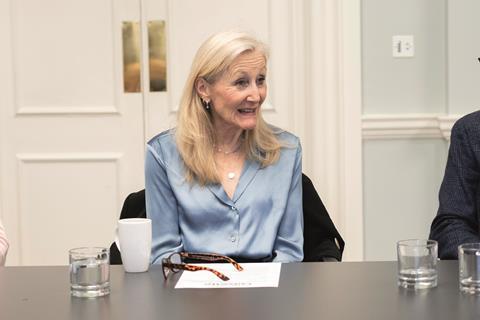
‘There is a risk that the AML process in particular can be seen as divorced from other risk, and it’s a box-ticking exercise that somebody else does,’ DWF partner Sheona Wood says. ‘Think of the culture of a law firm,’ she urges, ‘where everyone from the partners down knows that they have to have an ethical compass, they have to be alert to risk.’
In addition to training, she says, it is important to have ‘conversations on a daily basis about things that were near-misses’.
'How can we devise systems and ways of working that support those processes in a world that is becoming more regulated? I don’t think there’s a silver bullet'
Olly Thornton-Berry, Thirdfort
Having the right ‘culture’, Jenner & Block partner Rob Dalling asserts, is ‘particularly [important] where a firm has multi-jurisdictional presence, where there may be – very likely will be – differences in the regulatory regime’. His own firm is headquartered in the US, where there is no equivalent body to England and Wales’ SRA. ‘When you’re looking at the head of a GC function, an internal risk function, it’s absolutely essential that they are attuned to these variations,’ he notes.
‘Every single firm has a unique approach to risk and risk tolerance,’ Thirdfort founder Olly Thornton-Berry observes. Thirdfort, sponsor of the roundtable, provides automated identification and AML checks. ‘The thing that we spend a lot of time thinking about is, in a world where this is not a one-size-fits-all, firms have slightly different requirements for what they need,’ he relates. ‘They should be able to toggle and tweak a system they’ve worked with to work best for their own systems and processes when it comes to client risk.
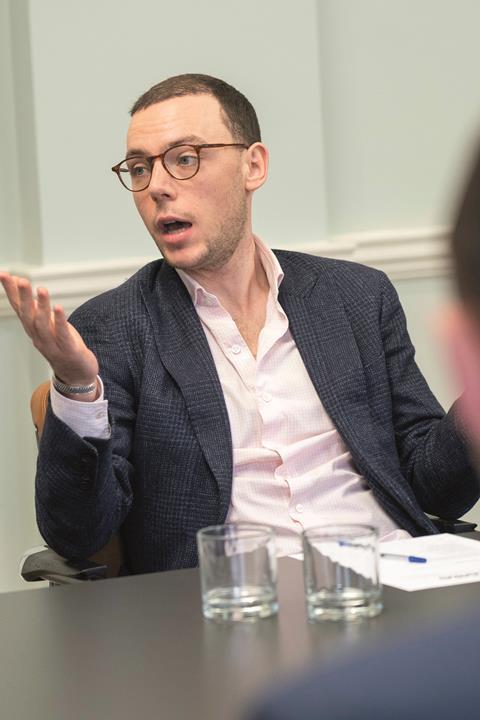
‘How can we devise systems and ways of working that support those processes in a world that is becoming more regulated?’, he asks. ‘I don’t think there’s a silver bullet. I actually don’t think technology yet solves all the problems.’
Equally, Thornton-Berry says: ‘I also don’t think on the other end of the spectrum, hiring more and more people, getting bigger and bigger teams [is the answer]… you have to adopt technology somewhere. It’s a question of how it fits, how configurable is it.’
Law firms need an approach that can adapt to different challenges. Is a satisfactory AML regime helpful when dealing with the explosion of sanctions restrictions since Russia’s 2022 invasion of Ukraine?
John Binns, partner at BCL Solicitors, says: ‘The contrast with AML is interesting because, on the face of it, they’re both about dirty money.’ The AML requirements, Binns adds, are ‘quite prescriptive in terms of what rules you’ve got to follow and what processes you’ve got to have… Whereas sanctions start from the perspective that you’ve got this strict liability and penalty regime and it’s up to us all to sort it out.
‘I’m very mindful,’ he says, ‘of the fact that it’s a government agenda, [and] is deliberately quite vague.’
Risk and compliance: who pays?
Demands relating to client due diligence, source of funds and compliance with sanctions regimes have increased the regulatory burden on firms significantly.
But who pays? Are law firms expected to spread the overheads equally between low- and high-cost practice areas? Can a client be billed more for being in a higher-risk demographic?
Peters & Peters partner Anna Bradshaw says that as ‘a boutique criminal law firm we would, by definition, need to think very carefully about where money comes from and make appropriate checks internally.
‘We are now much more careful at the outset so that we have a sense-check before we go down the compliance road,’ she adds. Another complication is that banks may have a stricter regime than law firms: ‘When you’re acting for sanctioned people,’ which may be permitted, she notes, because of the right to representation, ‘you may have all the licences that you need, yet the banks will turn around and say, “it’s not within our risk [appetite]”… that’s increasingly the situation that we face now.’
Teacher Stern partner Victoria Hodges notes: ‘We’ve had matters before where the amount of time it takes to open the file is actually more than the time you’re going to spend doing the work itself. Sometimes I’m sure it does lead people to think actually, it’s really not worth taking on this client or this piece of work, because I know I’m really going to struggle to open the file. I’m going to have to delve into the matter so much that you’re almost fee-estimating based on part of that time as well, because how can you not take that into account?’
Is there a point of legal ethics engaged on this issue? BCL partner John Binns (pictured) says: ‘It can’t be right to take on the highest-risk clients as long as you charge them more… It makes me queasy to charge more to the riskier client. It rather looks as though you’re taking more money for the potential [of] money laundering.’
Kingsley Napley’s Colette Best observes: ‘Actually, my concern was the flip side, that actually if you’ve got lower-risk clients, that they are then cross-subsidising the higher-risk clients.’
Thirdfort’s Harriet Holmes notes that with due diligence costs, some expense is openly passed on: ‘There are many firms that do charge… not necessarily a lot extra, but nominal amounts.’

Are some firms substituting scrutiny of clients with a broad brush abundance of caution? Iain Wilson, partner and COLP at Brett Wilson, observes: ‘It’s interesting hearing what’s happening at larger firms. We’re constantly being contacted by colleagues of larger firms who are saying, “I need… to help this person [but] I’m not going to get it through compliance in time” or, “they’re not going to like it for reputational reasons. It’s really annoying. I’m giving away so much work, but can you look after them?”.’
Wilson notes there are professional principles at stake: ‘There are obviously real access to justice issues if clients can’t find lawyers.’ So, are clients which are rejected by bigger firms when alarm bells ring going to firms with a smaller compliance function, and being accepted without proper due diligence?
Wilson says boutique firms like his may actually have better controls. ‘At a boutique firm, I think there are some advantages in having a smaller number of people, a more intimate setup, where you’ll have partner involvement in every case. It’s less likely, I suppose, that you have rogue fee-earners hiding in the corner of some office somewhere who may be exposing the firm to risk.’
Real-life examples of firms which have got things wrong are a valuable resource in training colleagues, Thirdfort’s Harriet Holmes notes. Referencing the Solicitors Disciplinary Tribunal, she says: ‘If you have a look at the recent decisions, there’s a great training opportunity there to talk to people about what’s happening, what is their activity, what are the things that they’re picking up on, and can you take any learnings from – unfortunately – other people’s misfortunes.’
Law firms’ and banks’ treatment of ‘politically exposed persons’ (PEPs) has proved controversial. MPs have, for example, had banking facilities temporarily withdrawn through what seems an abundance of caution.
Sewell believes examples of extreme caution are a ‘red herring’ when the real issue is, or should be, ‘source of funds’.
'The main takeaway… was that AML is the problem, not the solution, because AML loves anything that’s a false sense of security'
Anna Bradshaw, Peters & Peters
Anna Bradshaw, partner at Peters & Peters, argues that the ‘explosion’ in sanctions has had a wider and perhaps beneficial effect. ‘At least one upside is that it has refocused attention on the importance of due diligence. We had a real change of approach within our firm,’ she says. ‘We realised that the way that we delivered our training and we dealt with our issues would not be sufficient to capture the numerous sanctions. So, we had roundtables, just like this, and we sat everyone down for an hour. We forced a dialogue.’
Bradshaw adds: ‘The main takeaway… was that AML is the problem, not the solution, because AML loves anything that’s a false sense of security. That if you’ve done your KYC [know your client], if you’ve checked that you know who your client is, you’ve even gone to the trouble of establishing their source of funds, then happy days, off you go. You can’t do that any more.’
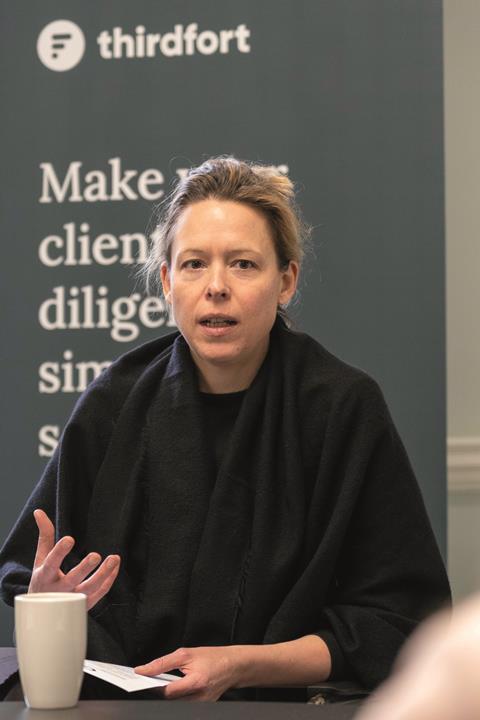
Why so? One reason she cites is the emergence of forged documents. ‘As of three years ago,’ she says, ‘they come up all the time – and outright lies – where you don’t expect them.’
Not only partners but also less experienced associates ‘need to be on their guard throughout the life of the case’, she stresses. ‘It’s the associates who are your key asset when it comes to making sure that that continuous monitoring is properly done.’
Enhanced risks, Bradshaw notes, come at a time when there is enhanced work pressure on lawyers: ‘It’s also complicated by the fact that the explosion in sanctions is accompanied by an explosion in legal work.’ This is also a time, she points out, when the law itself is moving fast. ‘As a result, you can often get even KCs not giving advice that you may necessarily agree with, because it’s new for everyone. So, you’ve got to be on your guard also with your fellow lawyers.’
Steps such as identity checks, Sewell notes, should not distract from fundamental questions a lawyer needs to address. Identity checks are an ‘unhelpful’ move away from the terminology of ‘know your client’. He asks: ‘Really who are you acting for, in terms of: is the person presenting actually the person that they are asserting that they are? Also, who is actually receiving the benefit of your advice?’
He observes: ‘It’s a slightly tortured area that compliance folk grapple with.’
‘One of the key attributes of a lawyer or anyone working in a law firm is a curious or questioning mindset,’ Wood stresses. ‘You never accept anything at face value.’
The area of ‘synthetic identities’, Sewell notes, has become more sophisticated. This is a theme Mawdsley takes up: ‘I saw a fascinating presentation once by City of London Police, where they raided a print shop and [found] swatches of all the passports. They had loads of fake gun licences. It was jaw-dropping.’
Several attendees note that understanding a transaction in the round – its purpose and who benefits – is an important line of defence for law firms. This also means that junior staff, whose work may be confined to a small part of the deal, understand it in these terms so they can spot anything untoward.
Close interest in a client’s affairs needs tactful handling, of course. What is the best approach? Wood notes: ‘Corporate clients have to do this themselves with their own customers or relationships. So, they understand.’
The wrong line to take is ‘compliance told me I’d got to do it’, Thirdfort’s Holmes says. ‘Give a bit more of a context and actually [say]: “We’re not suspicious of you, we’re just curious of everybody, we’re not singling you out, this is something everybody who we work with goes through as well”.’
As the discussion concludes, Thornton-Berry notes that client checks and a deep understanding of the purpose of transactions are more important than ever. ‘Source of wealth is getting harder [to check], without a doubt,’ he notes. ‘Technology has helped to a certain extent. I think there’s more that technology can do. We spend a lot of time thinking about how can we lend firms support through that.’
- This roundtable discussion was kindly sponsored by Thirdfort
Photographs by Noah Da Costa























